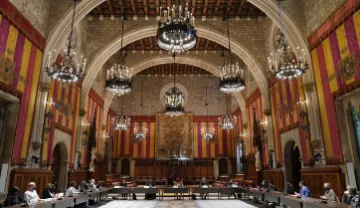CIDOB kicks off three Horizon 2020 projects and a new research agenda for the Global Cities Programme

CIDOB
- On May 4, CIDOB presented its new agenda for the Global Cities Programme in 2021 at the Barcelona City Council. This agenda includes innovative initiatives such as the CIDOB Dialogues on Global Cities, the Observatory of Urban Artificial Intelligence, and the cooperation in the launching of an urban action plan for the green and digital transitions that will be presented at the COP26 in Glasgow.
- In April, CIDOB kicked off three research projects – BRIDGES, Whole-COMM and JOINT – funded by the European Union (EU). Over the next three years, these projects will produce knowledge and policy recommendations on the production and impact of migration narratives in different European countries; the integration of migrants in rural areas; and the capacity of the EU to set an integrated foreign and security policy in a context of growing fragmentation.
Towards the European transformation and recovery: urban innovation for the Next Generation EU
On May 4, CIDOB presented its new agenda for the Global Cities Programme in 2021 at the Barcelona City Council’s Saló de Cent. The event, entitled Towards the European transformation and recovery: urban innovation for the Next Generation EU, was chaired by Pol Morillas, director of CIDOB, and Laia Bonet, Deputy Mayor of Barcelona for the Agenda 2030 and the Digital Transition. Once again, CIDOB and the Barcelona City Council renew the cooperation agreement that keeps the Global Cities Programme running since 2017. This year, the programme will focus on the study of the role of cities in global governance and the main socioeconomic and environmental challenges facing them.
During the discussion, the teams of CIDOB’s Global Cities Programme and the Barcelona City Council, together with other guest experts, reflected on the relevance of urban innovation in the process of transformation and recovery. They also analysed how cities – and Barcelona, in particular – should take advantage of the opportunity offered by the Next Generation EU to boost social recovery and promote a thorough revision of the productive system towards more sustainable, inclusive, and innovative models.
“The recovery, transformation and resilience strategies promoted by the EU Member States within the framework of the Next Generation EU should take into account the innovation capacity and ability to propose solutions that European cities have been proving for a long time. This may be key to prompt a more impactful transformation that goes beyond the great state structures, the big companies, and pulling projects; thus, reaching out to SMEs, professionals, the third sector, the cultural sphere, trade, and the most vulnerable sectors”, said Agustí Fernández Losada, director of CIDOB’s Global Cities Programme.
New Horizon 2020 research projects: migration narratives, integration, and foreign and security policy
In April, CIDOB kicked off three research projects – BRIDGES, Whole-COMM and JOINT – funded by the European Union (EU) under the Framework Programme for Research and Innovation Horizon 2020 (H2020). Over the next three years, these projects will produce knowledge and policy recommendations on highly relevant topics for current public debate, such as: the production and impact of migration narratives in different European countries (BRIDGES); the integration of post-2014 migrants in rural areas and small- and medium-sized European cities (Whole-COMM); and the capacity of the EU to set an integrated foreign and security policy in a context of growing fragmentation and contestation, both globally and internally (JOINT).
In the case of BRIDGES, CIDOB is the general coordinator of the project under the scientific leadership of Blanca Garcés Mascareñas, and in cooperation with a consortium of 12 research and civil society organisations. CIDOB thus strengthens its expertise in the coordination of and participation in EU-funded projects, particularly under the framework programme H2020, and also enhances its cooperation with institutions, universities, and research centres from all over Europe.
View image gallery: Presentation of the 2021 research agenda of the CIDOB Global Cities Program